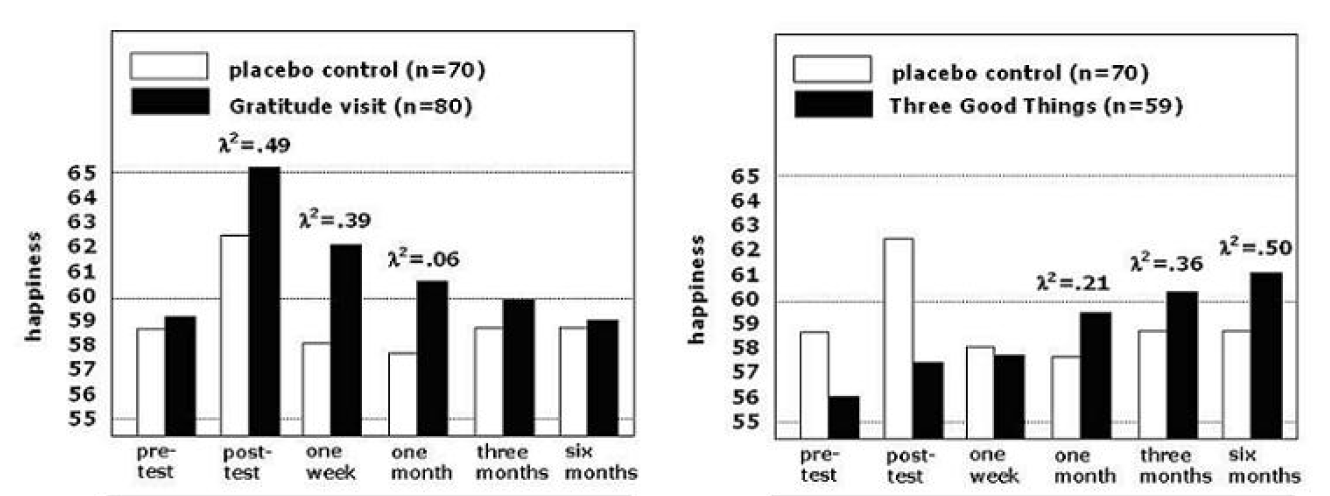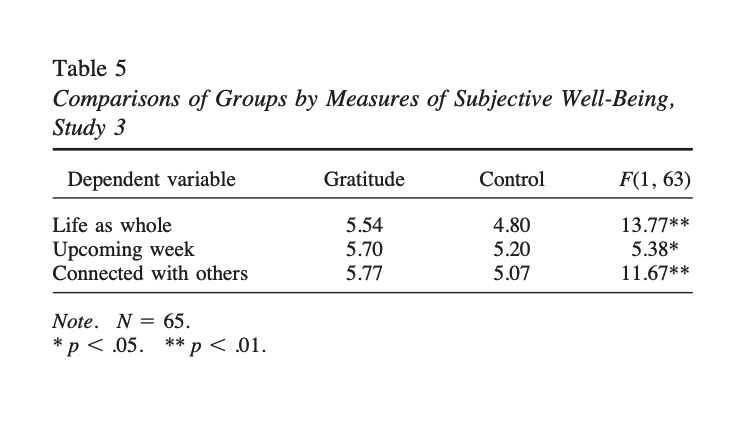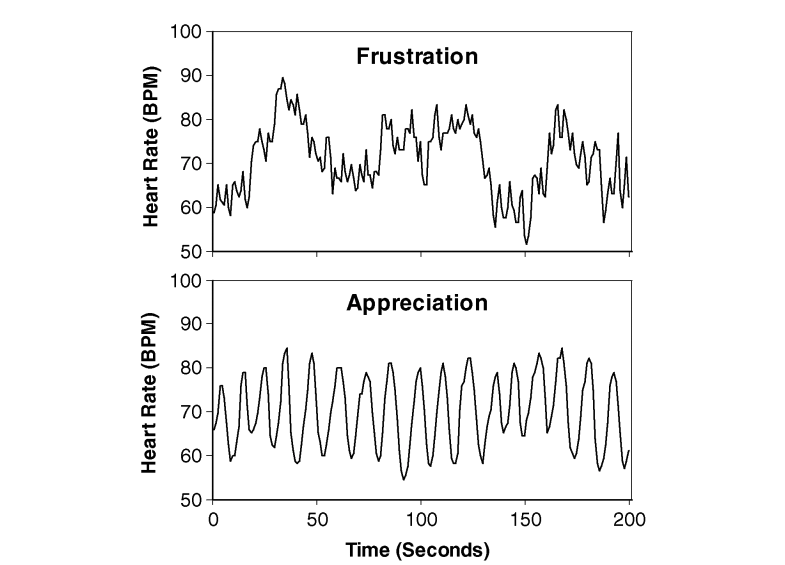Benefits of Gratitude
Published May 4, 2020

At some point in your life, you’ve likely been told that you should “focus on the bright side” or think of all the good things in the world. It might seem apparent that this would make you a more pleasant person to be around (no one likes a complainer) but are there any actual science-based benefits of practicing gratitude? How does it affect your moods? Does it have a major impact on the chemicals in your body? Can it make you physically healthier?
Luckily, with the emergence of the positive psychology field, there have been dozens of studies to uncover the answers to these questions. Studies have shown that there are some very real benefits of gratitude ranging from reducing stress to improving your relationships. The positive psychology field has been growing in recent years and we can expect to see many more studies and findings involving gratitude and other wellness habits.
Gratitude can have a positive effect on happiness, social bonding, coping, and even sleep.
Overview of Benefits of Gratitude
Gratitude can be a surprisingly powerful emotion. The benefits you receive from expressing gratitude typically depend on how you go about doing so. But there are generally a few effects you might expect to see:
- Ability to see the good in any situation
- Increased empathy for others
- Resilency in difficult situations
- A feeling of calm and reduced stress
All of the above probably sound great, but not very surprising. My goal here is to share some learning from scientific studies to actually show how gratitude can impact your mental health, physical well-being, and success in life.
Some of the topics we'll cover include:
- Measurable increase in happiness
- Decrease in depressive symptoms
- Better sleep
- Healthier relationships
- Improved social support and prosocial behavior
We’ll take a deeper look at some of the research behind these finds in this article.
How Gratitude Affects Your Mental Health
Gratitude provides a new way of looking at the world - one that focuses on the positive and learns to find the good in any situation. Practicing this outlook can have a profound effect on your mental health in the following ways:
- Happiness & decrease in depressive symptoms
- Subjective well-being: Life as a whole and connectedness
- Coping and resiliency
I've selected a few studies that illustrate the effects of gratitude on your mental health. This is just a starting point, especially if you're interested in exploring methodologies and sciencific discussions.
Happiness & Depressive Symptoms
In one study that measured the impact of six exercises on overall happiness and depressive symptoms, two that stood out were Three Good Things in Life and Gratitude Visit 1. In the Three Good Things in Life exercise, participants would write about three things that went well that day along with their causes and a “casual explanation for each good thing.” The Gratitude Visit exercise involved participants writing a letter of thanks and delivering it in person to someone who had been kind but not ever properly thanked.
Three Good Things had one of the largest measurable impacts that lasted even after six months, slowly increasing over time. At the end of the period, overall happiness had increased by roughly 10% amongst participants. This particular habit is very similar to gratitude journaling and explains why positive psychologists recommend the practice.
Researchers found that participants in the Gratitude Visit exercise had the highest initial impact on their happiness but that those feelings had completely reset after three months. This may have been partially due to the novel nature of the action.

It seems intuitive that gratitude might make you happier, because it helps you focus on the good in any situation. Even on a terrible day the sun rises and sets.
Subjective Well-Being
In a seminal study on gratitude by Emmons AND McCullough2, the researchers studied the effects of a 21-day daily gratitude practice on participants daily experiences.
“[P]articipants in the gratitude condition reported considerably more satisfaction with their lives as a whole, felt more optimism about the upcoming week, and felt more connected with others than did participants in the control condition ... Therefore, it appears that participation in the gratitude condition led to substantial and consistent improvements in people’s assessments of the global well-being.”2

Considering that the study only measured three weeks of gratitude, these results suggest that a consistent gratitude practice could have a significant impact on overall life satisfaction.
Coping and Resiliency
Gratitude allows us to “focus on the bright side” or think of the “glass as half-full,” but what have researchers found in regard to how it can help us get through tough situations?
One group of researchers examined individuals affected by the events of September 11, 20013. They studied the prevalence of positive emotions such as gratitude, interest, and love. They found that “...analyses suggest that positive emotions were critical active ingredients that helped resilient people to thrive despite the emotional blows delivered by the September 11th attacks.”
Other researchers have explored how we might use positive emotions like gratitude to help buffer ourselves from adverse events4. During the current COVID-19 crisis, this could be recognized in the increase of gratitude and appreciation for healthcare workers and acts of kindness for people less-fortunate.
How Gratitude Affects Your Physical Well-Being
It’s not surprising that gratitude can have an affect on your physical well-being as well as your mental health. There are plenty of known connections between the way we think and act and the way our bodies respond. For example, you might typically feel like you have more energy when you are happier, so if gratitude increases your happiness, you’d be safe to assume it might indirectly give you some boost in energy.
Some of the more interesting relations that we’ve seen in research include the following measured affects of gratitude:
- Improvement in sleep quality and refreshed feeling after waking
- Impact on your cardiovascular and nervous systems
We'll add more to this list as we discover new research worth sharing!
Sleep Quality
The study we mentioned earlier by Emmons and McCullough on gratitude asked participants to report on daily physical well-being in addition to the subjective characteristics discussed above. The two most significant measurements involved sleep:
“...participants in the gratitude condition reported getting more hours of sleep each night than did participants in the control condition”2

If gratitude can actually help you sleep better then it could lead to a abundance of other health benefits. Consistently getting a good night of sleep has been connected to increased cognitive function, emotional regulation, and even immune strength. We’ll explore more of the research on sleep in an upcoming article.
Cardiovascular and Brain Benefits
What does a state of gratitude actually look like in the human body? We found a study that looked at the heart rates of people who were in a state of frustration versus appreciation5. Feelings of gratitude, calm, and appreciation are often associated with one another and could be an effective tool in cooling off or handling less desirable emotions of anger and frustration.

Even more interesting was that researchers discuss the relation between heart rhythms and activity in the brain:
“Thus we have found that sustained positive emotions such as appreciation, care, compassion, and love generate a smooth, sine-wave-like pattern in the heart’s rhythms. This reflects increased order in higher-level control systems in the brain, increased synchronization between the two branches of the ANS, and a general shift in autonomic balance towards increased parasympathetic activity.”5
It’s exciting to consider what further research involving the affect of gratitude on our brains might uncover!
How Gratitude Affects Your Success
Gratitude can have enormous benefits to your relationships, social bonds, and overall success in life. Happier people are typically considered better to be around, but positive psychologists have taken a deeper look the connection between gratitude and prosocial behaviors to understand if gratitude can give you an advantage in our very social world.
Researchers have found that gratitude benefits:
- Forming bonds and friendships
- Building relationships and communicating with loved ones
- Social support
- Tipping and other acts of empathy
Once again, this is just a small sample of research and there are many more studies that explore how gratitude can catalyze a successful life.
Gratitude Strengthens Bonds and Relationships
A study involving 566 adolescents found that gratitude growth predicted a decrease in antisocial behavior and increase in prosocial behavior over 4 years6. Children who feel more gratitude may be at an advantage in terms of making friends and having a healthy social life! The same study also found that social behavior growth had a reciprocal relationship with gratitude growth. In essence, being more social can lead to increased gratitude.
It makes sense that gratitude would help with social behavior. Showing appreciation and being more likely to help each other are key to any healthy relationship. Learning to work with others is also crucial for success both in school and later in the workplace.
Building Relationships
In 2011, Nathaniel M. Lambert and Frank D. Fincham at Florida University published a study to explore the ways “expressing gratitude would increase positive perception of a relationship partner, thereby increasing comfort in expressing relationship concerns, which is a form of relationship maintenance.”7 Expressions of gratitude were tested against grateful thoughts, neutral interactions and positive interactions between the partners.
“...expressing gratitude for a friend increased both participants’ positive perception of the partner and comfort in voicing relationship concerns to that friend over and above the effect of thinking grateful thoughts or having an unrelated positive interaction.”
There’s an important takeaway here: expressing gratitude outwardly has additional benefits, particularly in your relationships. Just thinking grateful thoughts isn’t as effective!
Social Support
A study involving police officers measured “the role of gratitude, resilience, satisfaction with life and social support in protecting officers who worked during or after Hurricane Katrina from symptoms of depression.”8
“Gratitude was associated with both reduced symptoms of depression and higher satisfaction with life. Officers with higher gratitude were more likely to have higher social support, which was associated with fewer symptoms of depression and higher satisfaction with life.”8
Someone who expresses gratitude will be more likely to appreciate the good things in their life and choose to accept support when it is offered. There’s a great deal of research specifically targeting how social support is crucial to success and satisfaction with life.
Tipping, Volunteering, Etc.
A summary paper, Gratitude in Practice and the Practice of Gratitude9, explores many of the recent studies related to gratitude. One pattern seems to emerge: gratitude can touch all aspects of life and be a tool for positive change.
“Research has also shown that expressions of gratitude can reinforce kidney donation ... and volunteering behavior toward people with HIV/AIDS ... and field experiments have shown that mere thank-you notes can bring increased tips from customers ... higher response rates on mail surveys ... and more visits from case managers in a residential treatment program”9
We recommend taking a deeper look at some of the sources from this reference to further explore these behavioral changes from gratitude.
How To Be a More Grateful Person
Becoming a grateful person isn’t something that just magically happens. Some people may be more naturally prone to feelings of gratitude, but there are exercises and habits that anyone can do to boost their ability to feel grateful. In the same way that novice runners can train to run a marathon, anyone motivated by self-improvement can enjoy the benefits of gratitude by training their gratitude “muscle.”
Before you compare yourself to your kindest friends or well-known gratitude gurus, keep in mind that everything is relative and change is measured by improvement, no matter how small!
Gratitude Journaling - A Simple Way to Practice Gratitude
As mentioned in the research summaries above, one of the most promising exercises for increasing gratitude is Three Good Things - the act of writing down and reflecting on three things that went well at the end of each day. This exercise is very similar to the act of gratitude journaling.
We designed the Happyfeed app to be a simple way to record happy moments and gratitudes each day.
Apps provide all sorts of benefits from photo uploading to fun ways to explore past memories
Looking for an easy way to journal?
Happyfeed is a simple gratitude journaling app available for iPhone and Android. We make it easy and fun to start your new habit.
Try it freeIf you aren’t interested in downloading an app, you can always try a good old-fashioned notebook or one of the thousands of creatively designed physical gratitude journals (try a quick Google search). The most important thing is to create a habit that works for you. We offer some tips on how to effectively start a new habit in this post about Forming Healthy Habits.
Further Work
At the end of the day, I'm not a positive psychology researcher in a lab at a top university, but instead an engineer who is very intrigued by the way gratitude can improve our lives. I'd love to connect with anyone involved in research who comes across this article - perhaps there's a way to leverage technology to learn even more! Please let me know if I missed any important studies or made errors in my summarizations too.
Send me an email anytime at [email protected]
References:
1: Seligman, M. E., Steen, T. A., Park, N., & Peterson, C. (2005). Positive psychology progress: empirical validation of interventions. American psychologist, 60(5), 410. Link
2: Emmons, R. A., & McCullough, M. E. (2003). Counting blessings versus burdens: an experimental investigation of gratitude and subjective well-being in daily life. Journal of personality and social psychology, 84(2), 377. Link
3: Fredrickson, B. L., Tugade, M. M., Waugh, C. E., & Larkin, G. R. (2003). What good are positive emotions in crisis? A prospective study of resilience and emotions following the terrorist attacks on the United States on September 11th, 2001. Journal of personality and social psychology, 84(2), 365. Link
4: Gordon, A. K., Musher-Eizenman, D. R., Holub, S. C., & Dalrymple, J. (2004). What are children thankful for? An archival analysis of gratitude before and after the attacks of September 11. Journal of Applied Developmental Psychology, 25(5), 541-553. Link
5: McCraty, R., Atkinson, M., Tomasino, D., & Bradley, R. T. (2009). The Coherent Heart Heart-Brain Interactions, Psychophysiological Coherence, and the Emergence of System-Wide Order. Integral Review: A Transdisciplinary & Transcultural Journal for New Thought, Research, & Praxis, 5(2). Link
6: Bono, G., Froh, J. J., Disabato, D., Blalock, D., McKnight, P., & Bausert, S. (2019). Gratitude’s role in adolescent antisocial and prosocial behavior: A 4-year longitudinal investigation. The Journal of Positive Psychology, 14(2), 230-243. Link
7: Lambert, N. M., & Fincham, F. D. (2011). Expressing gratitude to a partner leads to more relationship maintenance behavior. Emotion, 11(1), 52. Link
8: McCanlies, E. C., Gu, J. K., Andrew, M. E., & Violanti, J. M. (2018). The effect of social support, gratitude, resilience and satisfaction with life on depressive symptoms among police officers following Hurricane Katrina. International journal of social psychiatry, 64(1), 63-72. Link
9: Bono, G., Emmons, R. A., & Mccullough, M. E. (2004). Gratitude in practice and the practice of gratitude. Positive psychology in practice, 464-481. Link

